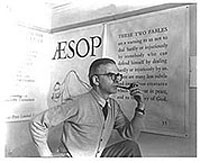
We
are all of us guests on this planet
And with guests — you know how
it is
Some are nice and some are tiresome
And some behave as if they were hosts
and even as they die they believe
that
they have owned the sun and the air and the history that took place
even
before they were born.
(from Collected Poems)
THE AIM OF AIMS
Some
naive lovers of semantics believe
that if only our leaders
(of all sorts)
could understand the meaning of their own pronouncements
they would amend their ways.
What an illusion!
They - the leaders
know the mechanism of Language much better than all the semanticists,
linguistic philosophers,
& logical formalists put together.
It's only that they use their knowledge for their own purposes.
And when a Poet
or a Novelist becomes a demagogue
the same applies to him.
Because POETRY as well as
POLITICS may be morally vicious,
and intellectually dishonest.
In such cases both Poetry and Oratory
(political, religious, philosophical)
are like Crime.
The greater a Crime is
the more impressive it is
but the less excusable.
Thus
when all is said and done
one finds that no poetic rhymes
and no politic aims
are more important
than decency of means.
Because when all is said and done
decency of means
is
the aim of aims.
Books
Jankel
Adler or an Artist seen from one of many possible angles. 1948
Aesop, The Eagle &
the Fox, the Fox & the Eagle. 1949
Bayamus
(and the Theatre of Semantic Poetry).1949
Wooff
Wooff or Who killed Richard Wagner? 1951
Professor
Mmaa's Lecture. 1953
The
Adventures of Peddy Bottom. 1954
factor
T (philosophical essay).
1956
Kurt
Schwitters in England.1958
The
Bone in the Throat (one-act play).
1959
Cardinal
Polatuo. 1961
Semantic
Divertissements. 1962
Tom
Harris.1967
Apollinaire's
Lyrical Ideograms. 1968
St
Francis and the Wolf of Gubbio (an opera,
libretto and music). 1972
Special
Branch (a dialogue). 1972
Logic,
Labels and Flesh (ten philosophical essays).
1974
On
Semantic Poetry. 1975
General
Piesc (The Case of the Forgotten Mission).1976
The
Chair of Decency (Johan Huizinga Lecture).
1982
The
Urge to Create Visions. 1983
The
Mystery of the Sardine. 1986
Hobson's
Island. 1988
Collected
Poems, 1999

